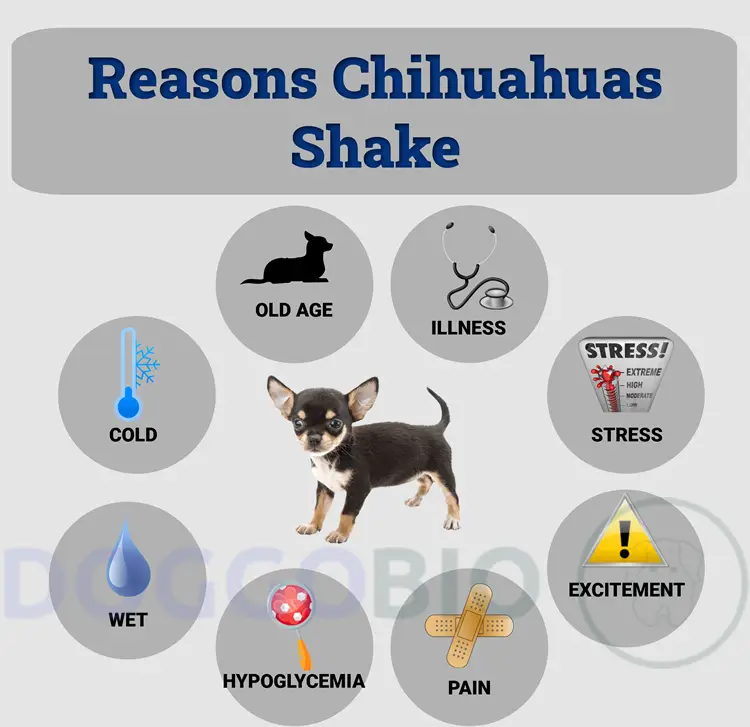“Why Do Chihuahuas Shake?” is a common question that intrigues many pet owners and animal enthusiasts. Chihuahuas, known for their diminutive size and spirited personality, often exhibit a shaking or trembling behavior that can be both curious and concerning. This phenomenon, while characteristic of the breed, can stem from various causes ranging from emotional states to physical conditions.
In this exploration, we delve into the reasons behind this distinctive trait, considering aspects of dog health that are pivotal in understanding and caring for these small yet spirited canines.
Why Do Chihuahuas Shake?
Chihuahuas are known for their shaking behavior, but it’s not just a random quirk. There are various reasons behind this behavior, ranging from physiological factors to emotional triggers.
Understanding these reasons can help Chihuahua owners provide better care and comfort for their furry companions.

1.Temperature Regulation
While Chihuahuas hail from Mexico, a country known for its warm climate, they aren’t naturally equipped to handle cold temperatures.
Their coat, especially if they’re of the short-haired variety, provides minimal insulation. This makes them prone to feeling cold even in mildly chilly environments.
When their body temperature drops, they immediately respond to shiver to generate heat. This is why it’s not uncommon to see Chihuahuas dressed in sweaters or jackets, especially in colder regions.
2.Old Age
Aging brings about many changes in dogs. As they age, Chihuahuas might develop conditions like arthritis, reduced vision, or hearing. These changes can be disorienting and cause discomfort, leading to shaking.
Providing them a comfortable living environment, regular vet check-ups, and age-appropriate care can ensure their golden years are comfortable.
3.Pain and Injury
Despite their aggressive nature, Chihuahuas are delicate. A fall, a rough play session, or even a minor injury can cause them significant pain.
Shaking, in this case, is a sign of their discomfort. Being cautious about their play environment, using protective gear like harnesses, and regular vet check-ups can prevent injuries.
4.Poor social skills
Every dog, regardless of breed, benefits from early socialization. It helps them navigate the world confidently and reduces anxiety in unfamiliar situations.
If not socialized early, Chihuahuas can become apprehensive or fearful around unfamiliar people or animals. This anxiety can manifest as shaking. It’s a sign they’re feeling threatened or unsure. Regular socialization, training, and positive experiences help reduce this behavior over time.
5.Excitement or Anticipation
Chihuahuas are known for their enthusiastic nature. The prospect of a walk, a treat, or playtime can send them into a flurry of excitement. This intense emotion can sometimes be so overwhelming that they shake with anticipation. It’s their body’s way of expressing the joy and excitement they’re feeling.
6.Fear or Anxiety
The world is a vast and sometimes intimidating place for a Chihuahua. Situations that might seem routine to us, like a car ride or a visit to the vet, can be sources of immense stress for them. Loud noises, unfamiliar places, or even unfamiliar faces can trigger fear or anxiety.
7.Stress
Chihuahuas, with their keen senses and observant nature, are highly attuned to their environment. Changes, whether a new house, a new family member, or even a change in routine, can induce stress.
They thrive on routine and familiarity, and disruptions can affect their emotional well-being. In such situations, shaking is a sign of their emotional turmoil. Maintaining consistency, providing comfort, and slowly introducing changes can help reduce stress-induced shaking.
8.Hypoglycemia
Given their high metabolic rate, Chihuahuas require regular meals to maintain their blood sugar levels. If they go too long without eating, or if their diet isn’t balanced, they can experience a drop in blood sugar, known as hypoglycemia.
This condition can be serious, with shaking being one of the early warning signs. Other symptoms include lethargy, weakness, and in severe cases, seizures. Regular meals, snacks, and monitoring of their diet can prevent this condition.
9.Allergies
Chihuahuas, like all dogs, can develop allergies. Whether it’s environmental allergens like pollen or food allergens, their body’s immune response can lead to various symptoms.
Shaking, itching, sneezing, and even digestive issues can indicate an allergic reaction. Regular vet check-ups, allergy tests, and monitoring of their environment can help identify and manage allergies.
10.Toxicity
Their curious nature and small size mean Chihuahuas are at risk of ingesting substances that can be toxic to them.
Everyday household items, certain foods, or plants can be harmful if ingested. Shaking, along with other symptoms like vomiting, diarrhea, or lethargy, can indicate toxicity.
Being vigilant about what they can access and educating oneself about common toxins is crucial.
11.Sickness
Dogs, like humans, have their way of showing when they’re unwell. Shaking can signify various illnesses, from infections to more severe conditions. It’s their body’s way of signaling that something is amiss.
Regular vet visits, vaccinations, and being observant about any behavioral or physical changes can ensure they get timely medical care.
Health Conditions That Cause Shaking

1. Fever
Fever, a rise in body temperature, is a sign of an underlying infection or illness. If a Chihuahua has a fever, it’s their body’s way of fighting off the infection. Shaking, in this case, is due to the elevated body temperature. Monitoring their temperature, providing comfort, and seeking veterinary care is essential.
2. Distemper
Distemper, a contagious viral disease, can have severe implications for dogs. Shaking, coughing, nasal discharge, and fever are common symptoms. Vaccination and regular vet check-ups are the best preventive measures.
3. Kidney disease
Kidneys play a pivotal role in maintaining a dog’s health. They filter out toxins and regulate various bodily functions. If they’re not functioning optimally, it can lead to a buildup of toxins, causing symptoms like shaking, increased thirst, and lethargy.
4. Generalized Tremor Syndrome
This condition, while not entirely understood, causes widespread tremors in dogs. With proper care, medication, and regular vet visits, the symptoms can be managed.
5. Ear infection
Chihuahuas, with their perky ears, are prone to ear infections. An infection can cause discomfort, leading them to shake their heads frequently. Regular ear cleaning, monitoring for signs of infection, and timely vet care can prevent and treat infections.
6. Nausea
Nausea, whether due to dietary indiscretions, motion sickness, or an underlying health issue, can be uncomfortable for a Chihuahua. Shaking, drooling, and a refusal to eat are common symptoms. Identifying the cause and providing appropriate care can alleviate their discomfort.
7. Seizures
Seizures, a result of abnormal brain activity, can be distressing to witness. They can be symptoms of various conditions, from epilepsy to brain tumors. Recognizing the signs, providing a safe environment during a seizure, and seeking immediate veterinary care is essential.
8. Neurological disorders
Neurological disorders can affect a Chihuahua’s brain and nervous system. Shaking, altered behavior, and coordination issues are common symptoms. Regular vet visits, monitoring their behavior, and providing appropriate care can ensure they lead a comfortable life.
9. Demyelinating diseases
Diseases that affect the protective sheath around nerve fibers can lead to symptoms like shaking, weakness, and coordination issues. Early diagnosis, treatment, and regular vet care can help manage the symptoms.
How Can I Help My Chihuahua Stop Shaking?

1.Comfort
A Chihuahua’s emotional well-being is closely linked to physical well-being. Providing them with a safe, calm environment, filled with familiar sights and sounds, can significantly reduce stress-induced shaking. Soft bedding, their favorite toys, and regular human interaction can offer immense comfort.
2.Consult a Veterinarian
If the cause of the shaking remains elusive or if it’s accompanied by other symptoms, consulting with a veterinarian is essential. They can provide a proper diagnosis, recommend a treatment plan, and offer guidance on managing the condition.
3.Provide a Warm Environment
Given their susceptibility to cold, Chihuahuas benefit immensely from a warm environment. A heated bed, a cozy blanket, or a warm sweater can make a difference.
Ensuring they’re protected from drafts, have a warm spot to curl up, and are dressed appropriately for the weather can reduce cold-induced shaking.
4.Training and Socialization
Training and socialization, starting from a young age, can help Chihuahuas navigate the world with confidence. It reduces anxiety in unfamiliar situations, helping them become well-adjusted adults.
Regular training sessions, positive reinforcement, and exposure to varied environments can reduce anxiety-induced shaking.
5.Diet and Nutrition
A balanced diet, rich in essential nutrients, is the cornerstone of a Chihuahua’s health. Their high metabolic rate requires regular meals to maintain their energy levels.
Ensuring they have a balanced diet, regular meals, and access to fresh water can prevent conditions like hypoglycemia.
Chihuahuas Shaking Myths
Over the years, many myths about Chihuahuas and their shaking behavior have sprung up. Some attribute it to their size, while others believe it’s a breed-specific quirk. However, each shake, each shiver, has a reason.

Whether physiological, emotional, or health-related, understanding the genuine reasons behind their shaking can lead to better care and a happier Chihuahua.
Frequently Ask Question
Why Do Chihuahuas Shake So Much?
With their unique physiological and emotional makeup, Chihuahuas have various reasons for shaking. Understanding these reasons can provide insights into their behavior, whether it’s their high metabolism, emotional triggers, or an underlying health issue.
Owners can ensure their Chihuahua’s well-being by recognizing these triggers and responding appropriately.
Why Is My Chihuahua Panting And Shaking?
Panting and shaking, when observed together, can be a sign of distress or a health issue. Monitoring their behavior, ensuring comfort, and consulting with a vet can provide clarity.
Why Do Chihuahuas Shake When They Sleep?
Sleep is vital; like humans, dogs go through various sleep cycles. Shaking during sleep can be attributed to dreams or the REM phase.
However, excessive shaking or signs of distress might indicate discomfort or a health issue. Ensuring they have a comfortable sleeping spot, free from drafts or disturbances, and regular vet check-ups can help.
Why Do Chihuahuas Shake And Act Scared?
With its myriad experiences, the world can be intimidating for a Chihuahua. Situations that induce fear or anxiety can lead to shaking. Recognizing these triggers, providing comfort, and offering positive reinforcement can help them navigate these situations better.
Why Do Chihuahuas Shake Sound Like Choking?
Choking sounds, especially if accompanied by shaking, can be alarming. It might indicate a respiratory issue, an obstruction in their throat, or another health issue. Immediate veterinary attention is advised.
Why Do Chihuahuas Shake Excited?
With their boundless energy and enthusiasm, Chihuahuas wear their emotions on their sleeves. Simple joys can send them into a flurry of excitement, like a treat or playtime. This overwhelming emotion can sometimes lead to shaking. Recognizing and sharing in their joy can strengthen the bond between pet and owner.
Why Do Chihuahuas Shake After Shots?
Vaccinations, while essential for their health, can sometimes cause side effects. Shaking post-vaccination should be monitored; if it persists, a vet should be consulted.
Why Do Chihuahuas Shake After Eating?
Post-meal shaking can be attributed to their rapid metabolism or an allergic reaction to something they ate. Monitoring their diet, ensuring they don’t have access to toxic foods, and regular vet check-ups can prevent post-meal issues.
Conclusion
In conclusion, the question “Why Do Chihuahuas Shake?” uncovers a range of factors, from the innocuous to the significant. We’ve learned that while shaking can be a natural aspect of a Chihuahua’s behavior, often linked to their high energy and sensitivity, it can also signal underlying health issues.
As responsible pet owners, it’s important to observe the context and frequency of this behavior. Regular veterinary check-ups and a keen awareness of your pet’s normal behavior patterns are crucial.
By understanding the various reasons behind their shaking, we can ensure that these charming and spirited dogs lead comfortable, healthy lives. Remember, each Chihuahua is unique, and their health and well-being are paramount.

Pingback: Why Are Chihuahuas So Mean?: Unveiling Fierce Passion 2024